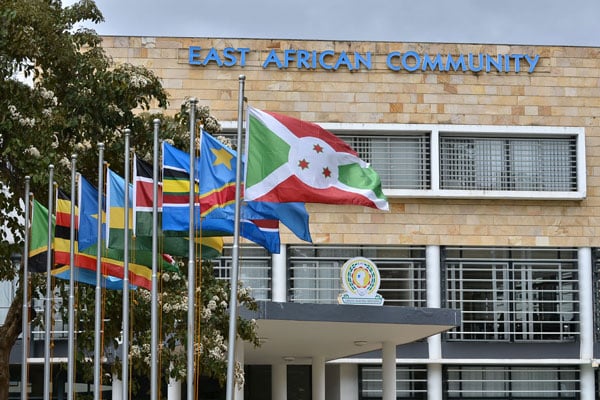Prime
A practical course changed Isiko’s life

Abubaker Isiko holding his award and certificate at the just concluded Uganda Film Festival. PHOTOS | Andrew Kaggwa
What you need to know:
- There is more to a film than the lights, camera and action. Sound, one of the most important part of audio visual art is always ignored
Most of the time, when a person describes themselves as a filmmaker, many around them will immediately assume they operate the camera.
Of course, films are a collection of moving pictures, but contrary to common belief, cinema is more than the camera, it is the pictures, lights, costumes, and sound.
In fact, it’s partly the reason most local films in the early 2010s struggled with sound. At that time, many people captured polished pictures and somehow thought sound wasn’t something they had to pay attention to.
And this was almost Abubaker Isiko’s life circa 2018, when he was a student at Makerere University, dance, and drama. He wanted to make films, and at the time, he was sharpening his skills with the lens.
In fact, he did a number of short films and experimental photography then; “I was a jack of all trades then, doing camera and sound; “but then I noticed there was a weakness with sound, plus, most of the people in our class wanted to be directors or actors.”
In fact, Isiko did some acting until he noticed that wasn’t his strength and stuck to being a crew member.
But all this was taking place when he was still at the university. Alongside two friends, they had set up a film production house - since they didn’t want to start from nothing, they made it a point to buy a few pieces of equipment.
“I told my parents there was an increment I had to pay, and they sent the money; I used part of it to buy my first sound kit,” he says.
Another friend got two cameras, and like that, the trio started making short films but did not make money.
Isiko had wanted to work with Adnan Ssenkumba, arguably one of Uganda’s best sound designers, but as much as he had paid attention to him, he did not get a chance to work with him immediately.
“One day, Adnan called me and gave me an appointment, he said I come with my equipment,” he says.
The meeting wasn’t in vain, they worked on a short film, Office Vacation.
Office Vacation may not have made headlines and won awards, but it opened the door for Isiko as he started working on different people’s documentary films and TV series.
That’s the time he was a boom swinger on Pan African legal drama Kafa Coh.
“I was happy that I was learning, I was Adnan’s assistant and went wherever he went. We had gone from having a teacher and student question and answer to having conversations about sound,” he says.
It was through such industry connections that one of the directors, Ken Joseph Ssebagala alias Zenken, noticed him. He worked with him on one of his projects.

Isiko and Daka Waira recieve a dummy check for Best Sound Design at UFF.
“So one day, Zenken sends me a message with a MultiChoice Talent Factory call,” he says.
The MultiChoice Talent Factory is a fully paid one year scholarship offered to young film enthusiasts across the continent. Through the programme, trainees get hands-on mentorship in sound, camera, script writing, sound, and business, among other things.
Trying luck
“I noticed that I was eligible and thus gave it a try,” he says.
He tried his luck, and he was shortlisted; “The interview was scary, but I was strong since I knew what I wanted. I have always known that maybe I can’t change the film industry, but I can contribute through sound.”
The interview was good, since he had asked the panel to let him use Luganda and English, he says he enjoyed it as much as the panel, he was himself.
Yet he did not get the scholarship.
He was discouraged but applied again when the scholarship was announced and this time round, he was selected. Every year, 60 young enthusiastic filmmakers are selected for the programme that is conducted in three campuses across the West, East and South African regions.
These are filmmakers from Uganda, Kenya, Tanzania, Malawi, Zimbabwe, Nigeria, Ghana and South Africa among others. Every country gets four participants, Isiko was one of Uganda’s four.
“Of course when i did the second interview, I was angry with them, I thought I had done everything right the first time,” he says.
His trip to Nairobi was his first out of Uganda, and he says that unlike the other Ugandan representatives that knew each other, he didn’t know them.
But he easily managed to fit in, even with the wider East African group that had both Tanzanians and Kenyans.
“It is a hands-on programme where participants are encouraged to help each other out,” he says.
Thus, during the programme, since he had access to cameras, lights and sound gear, he was always shooting experimental videos. And of course, the participants helped out as actors and crew people.
“The Talent Factory was an all round mentorship in camera, sound and production design. We had the opportunity of working with professionals that taught us how to be intentional with production decisions,” he says.
During the training, he collaborated with fellow student Daisy Masembe, and the result was the award winning Engaito.
But it wasn’t a smooth ride, the training was also happening at the time the world was plunged into a pandemic, thus, they had to leave the campus at one point without knowing what was going to happen next.
“I spent much of that time recording adverts for things that impressed me, just to keep myself busy,” he says.
Most of these ended up on his YouTube channel.
Niche
Today, Isiko is one of the most renowned sound engineers, working with Ssenkumba, he’s part of the prolific team that do sound design and sound recording for the popular telenovela Sanyu.
“During the training, many of the mentors they gave us had a telenovela background thus they usually recommended shows we could watch,” he says adding that he watched many South African telenovelas such as The River, Changes and Queen looking for specific things.
Earlier, as a student of MDD, Isiko had interacted with neo soul artistes such as Andereya Baguma, Shifa Musisi and Busulwa. When he was asked to do sound design for Sanyu, he knew he needed Ugandan neo soul.
“I contacted them and surprisingly, many of them loved the show. That’s when people started hearing different music on the show.”
The training in Nairobi, he says had sharpened his knowledge about a number of things he already knew, but most importantly, taught him how to be deliberate.
“I started appreciating reasons why people use the music they use in films,” he says.
Today, Isiko is still on the Sanyu set, however, he gets to work on many other sets and do more sound business on the side. For instance, with his friends, they have since set up Audio Rustle, a company that teaches and hires sound equipment.
Earlier this year, he was one of the many filmmakers that collected accolades during the Uganda Film Festival awards gala.
This was thanks to his role as a sound designer for the film The Passenger. The film follows a young man who tries to deliver a mysterious package to the city on a bus but another passenger thinks he is a killer carrying a mutilated body or bomb and is determined to stop him.
The film was the film to beat at the awards taking home Best Actor, Best Director and Best Post Production among others.
Isiko says working on Sanyu has helped him improve because of consistency but he has many lessons learnt, for instance he says feature films are more challenging than TV series.
“The longer the film, the more it’s challenging,” he says.
What next
Every year, 60 young enthusiastic filmmakers are selected for the programme that is conducted in three campuses across the West, East and South African regions.
These are filmmakers from Uganda, Kenya, Tanzania, Malawi, Zimbabwe, Nigeria, Ghana and South Africa among others. Every country gets four participants, Isiko was one of Uganda’s four.




